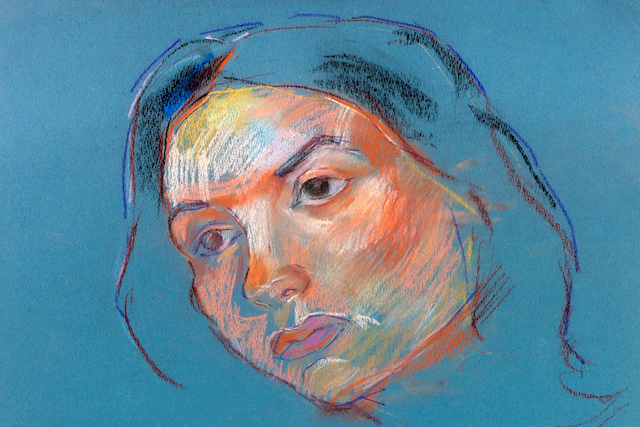
“When you realize there is nothing lacking, the whole world belongs to you.” ~Lao Tzu
Pretty much everyone I know thinks they should be doing better in some way, at least sometimes.
Are you totally and completely satisfied with what you’ve done so far in life? No little part of you thinks, maybe I should have more money in the bank? Or maybe I should have a more professional wardrobe, or a book contract, or a dog that’s housebroken?
The word “should” isn’t exactly enlightened or peaceful, nor is the practice of judging yourself or believing that you’re not exactly where you’re meant to be. But we’re human, so our thoughts inevitably go there from time to time.
We judge ourselves. We hold ourselves to standards that someone else made up—standards that may not even make sense for our current life.
I often hear people say things like:
- “I can’t believe I’m in my forties and still don’t have matching luggage.”
- “Shouldn’t my child be reading by now?”
- “I always assumed I’d exercise regularly after I finished college.”
- “I can’t believe I don’t have better health insurance at this stage in my career.”
I have to wonder, whose beliefs are those? Whose standards are they, really? It’s not like we wake up at forty and suddenly crave matching luggage. Someone fed us that expectation somewhere along the way, and we forgot it wasn’t our own.
Would the mother feel genuine concern for her child’s reading skills if they lived on a deserted island? Or is the pressure external, based on what others say, think, and read, and she simply doesn’t realize those thoughts aren’t hers?
And I, too, have thoughts like these all the time. Not those exactly, but ones like them.
Like how I should be famous by now. Really. The ship has sailed for being on Oprah, but isn’t someone going to beg me to come on their show? And how I always thought that by age thirty-four I’d own a home with a yard, not a small condo in the city. Or how I still buy all my clothes on sale and I don’t have a decent wardrobe. And how I still say “like” and “awesome” way too much for an adult.
So it’s starting to look like we’re all in the same boat with this I-should-be-doing -better stuff.
Since it’s such a universal human issue, maybe we can make a collective pact to just stop with the shoulds? Can we collectively agree to be just a little kinder to ourselves? Can we set aside the judgments and be proud of ourselves, right this minute, not when we achieve something we haven’t yet achieved?
Here are some ways you can work on dropping “I should be better” syndrome and decide you’re okay, right now.
1. Understand your own personal flavor of I-should-be-better.
How does this syndrome show up in your life? Are there particular times you’re more likely to compare yourself to others? Are there certain skills or habits or traits you’re always requiring of yourself?
Does it tend to show up primarily in your career, family life, weight, or finances? Or is it a theme across the board for you?
Is it triggered by particular people (i.e.: that “cool girl” from high school who is now your Facebook friend, or an older sister to whom you were constantly compared?)
Understanding how this tendency looks in your life—and being on the lookout for it—is the first step to dropping the habit.
2. Notice. Stop. Breathe.
When you find yourself in the middle of I-should-be-better, stop. Drop what you’re doing and take a deep breath.
I-should-be-better is cerebral and ego-based. It’s your mind spinning stories that aren’t real in any factual way.
So when you notice those mental stories spinning, stop and consciously shift from being in your mind to being in your body. The fastest and most effective way I know to do that is to breathe deeply and consciously. Notice, stop, and breathe.
3. Remember that you created the rules.
Remind yourself that the standards to which you’re holding yourself aren’t objective or real. You invented them and you’re the only one holding yourself to them.
Buying into the standards is simply a habit. With a little intention and awareness, change is not only possible, but within your reach.
4. Remind yourself that this is a universal issue.
Pretty much everyone feels this way at one time or another. It’s not just you.
And we can’t all be right. By definition, we can’t all be not good enough. If 99% of the population should be doing better, isn’t it time to change our definition of “good enough”?
5. Are you telling the truth?
How does it feel when you focus on what you should be doing?
If what you’re telling yourself doesn’t feel good, it’s probably not the truth. Don’t worry—that doesn’t make you a liar, it just makes you a perfectly normal human who believes too many painful and unnecessary thoughts.
Think about the rules you’re setting for yourself. “I should have more money saved” or “I should be further up the corporate ladder.” Can you absolutely know for sure that you should? What if you’re wrong? What if you’re exactly where you should be right now?
6. Look for the lessons.
Look for the lessons in the supposed “mistakes” you’ve made. Why is it that your kid isn’t reading as well as the neighbor kid? Ask this with an open mind, considering all possibilities. Is the neighbor kid extraordinarily gifted? Could your kid simply use a little more practice?
This is not an invitation to blame or judge, but an opportunity to look honestly at the situation and your role in it. If there was something you could do differently, what might it be?
What can you learn from this nagging sense of I-should-be-better?Because if you insist on being dissatisfied, you might as well learn something from it.
As hard as the “I should be better” syndrome can be, I actually see it as a sign of deep self-love to believe you deserve good stuff. You care enough to shame yourself over not having what you know you’re capable of.
Now maybe we can come together in the name of all that self-love and do it without the conditions. Without needing to prove our worth through arbitrary accomplishments. And without the shame.
About Amy Johnson
Dr. Amy Johnson is the author of several books, including The Little Book of Big Change: The No-Willpower Approach to Breaking Any Habit. She is also the creator of The Little School of Big Change, an online school that helps people find lasting freedom from habits and anxiety. Please go here to get a free sneak preview of the school.













 Though I run this site, it is not mine. It's ours. It's not about me. It's about us. Your stories and your wisdom are just as meaningful as mine.
Though I run this site, it is not mine. It's ours. It's not about me. It's about us. Your stories and your wisdom are just as meaningful as mine.
I really enjoyed this article :)))
My favorite line..”|What if you’re exactly where you should be right now?” That is going to be my new mantra. “I am exactly where I should be right now!” 🙂
Great article! I will actively try and BREATHE this weak. I know I do this all the time to myself, but never really wondered why. Thanks for filling in some of the gaps for me 🙂
Also, Tiny Buddha needs a +1 button, its all the rage now 🙂
http://www.google.com/webmasters/+1/button/
[…] TinyBuddha.com […]
Ugh, aren’t these expectations the pits? Mine are: “I’m 41 and I should be in a relationship!” and “I should be more creative and accomplished by now!” But when I stop worrying about that, I realize I have a wonderful, full life and am, in fact, extraordinarily lucky. Thanks for the reminder.
You are exactly where you need to be!! Be open to the possibility of everything!! 🙂
Great article!
Off late I feel that Facebook has become a platform for bragging.. Everyone is trying to post photos of exotic holidays they took …. or a new house/car they recently bought … or news about a new job. And many times as I read the feed I find myself having “I-should-be-better” moments… Its nice to be reminded sometimes that I am fine just the way I am.
Or, perhaps those people are just celebrating where they are. Perhaps the dysphemism, “bragging” is created inside yourself as a projection of your own inner feelings of inadequacy. If you are happy with where you are, no jealousy will come from seeing others happy and successful around you. You will be happy for them and it will inform your world view that everyone is beautiful and life experiences are meant to be cherished.
Lacklusterplus hit the nail on the head, Neha Gupta. It is good to celebrate your successes. Posting photos of these successes is only considered bragging by those who are comparing themselves negatively. Should people only post photos that are of their old stuff, and only talk about their lives if nothing good is happening, so no one else ever feels bad about themselves? We get more of what we focus on and celebrate! Do you perhaps feel, by others’ having, you cannot have? It is so freeing to be able to celebrate others’ good fortune, even if you yourself aren’t currently experiencing that! And yes, the bottom line as you stated, you are fine just the way you are!
Lacklusterplus hit the nail on the head, Neha Gupta. It is good to celebrate your successes. Posting photos of these successes is only considered bragging by those who are comparing themselves negatively. Should people only post photos that are of their old stuff, and only talk about their lives if nothing good is happening, so no one else ever feels bad about themselves? We get more of what we focus on and celebrate! Do you perhaps feel, by others’ having, you cannot have? It is so freeing to be able to celebrate others’ good fortune, even if you yourself aren’t currently experiencing that! And yes, the bottom line as you stated, you are fine just the way you are!
Thanks for sharing your thoughts @8946c7ed7d1924e49dbbf6def89504ad:disqus @a06272923115e75e36ef5ed8f2cd92ed:disqus – I agree. Perhaps people are just celebrating life and where they are and I am not able to feel the same way about my life. I am constantly focusing on what can be better.
Maybe it’s time for me to start “bragging” about my life 🙂
wow. you have brought a totally different perspective which makes me feel as though maybe i am secretly not happy for people who are happy… when i’m struggling with somethings.
this is EXACTLY why i deactivated my FB page a month ago… and the thought of reactivating gives me anxiety. its a constant barrage of people who are in the same struggle as us regarding “i should be better” therefore i will use FB to make myself feel as though i am better. its so much deeper than posting the latest vacation pic on FB to really and truly feel as though you are right where you should be with what you should have.. no posing necessary.
I like these small these small articles very enlightening.
Wonderful, and most needed.
Rgds Steve
Thank you. This is very timely for me. I ended my job in a school district today messing up my paper work, annoying my supervisor (whom I haven’t seen in months), and ending the school year on that note. But no…it’s just paper work! If it wasn’t done perfectly then that doesn’t mean I am a loser. I still deserve a nice summer.
This is exactly how I’ve been feeling as of late – “not enough”, or “too much”, or “less than”. It’s usually based out of comparing myself to others, or making lists in my head of all of things I Have To Do, yet haven’t done yet. But you can only make so many “haven’t done yet” lists in your head before you’re sick of the self-defeatist tone, and something else takes over.
Accepting that you are exactly as much as you should be, exactly where you should be, is such a freeing concept. I feel like the next few meditations I do will focus on feeling like I’m exactly enough, and eliminating the feelings of inadequacy. We’re often reminded to be patient with others, but we more times than not forget to also be patient with ourselves.
Love this article and wished I came across it earlier 🙂
Thank you for writing this! I’m definitely up there in the I-Should-Be-Better syndrome. I’m about that in practically every area of life right now. “Can we collectively agree to be just a little kinder to ourselves?” That part had me nodding and smiling. I’m going to try. 🙂
Do you see the trap? You could always be better. I ask you, better than what? It could always be worse. Compared to what? You have so much to be grateful for if you stop comparing. Better, worse, good, bad, get rid of those “comparing” words. Find your breath, hear the birds singing, and smile is born. There is bliss for you if you can wake up from your dream of comparing everything….every moment….all the time. Listen for the birds.
That’s right! Those are comparing words. I’m beginning to recognize I do a lot of comparing in my life and it is a huge source of unhappiness. It’s amazing the peace that surfaces when you leave things alone (the outside world or yourself) and notice what is. 🙂
“Outside?” Don’t make outside world. You are the world. Of course, what else would you be? (please forgive my ramblings. I do not want you to think I’m going to bother you all the time. I’ll shut up now)
I find that using the word “could” helps me because it implies that I have a choice. “Should,” however, connotes a forced decision from an external force. Using could instead of should helps keep me reasonably sane!
Yes, that’s me! 45, single, no kids…I so should be like many of my friends with their partners and kids. I really appreciate this topic as the “shoulds” don’t get me anywhere and I fall into that trap so often. I like the challenge of seeing whether I can change my thought patterns, as suggested, the next time a “should” comes up. By the way I also love the way this blog comes up with topics/advice that I could really do with right at this moment
Never should on yourself or others. It can be messy.
Thanks again Deena. Thank goodness for the buddhists. Love Tiny Buddha — those posts keep my raging self-talk in check. 🙂
Every time I hear the word “should”, I think of the awesome book by Dr. David Burns, “Feeling Good”. He has a whole section about how that word gets you into trouble by projecting how you think a situation will go or how someone will respond. The trap I always fall into is thinking how people “should” behave. We “should” all want to be kind and follow the rules, right? Nope. Any expectation you have of someone else or yourself like that will lead to disappointment. I catch myself using that word all the time and it’s a good way for me to pay attention to unhelpful thoughts and expectations.
I have always been a bit of a lone wolf, so I have an easy time staying out of the “I should be better” trap but I see so many people struggle with it. I like to say – let other people’s accomplishments motivate you, or inspire you, but don’t let it affect your worth by comparing. It’s like apples and oranges. We each have something unique, essential and positive to contribute to the world. You are exactly where you need to be in your life.
Great piece, Dr. Johnson! Thank you for the reminder. 🙂
[…] also stared down many of my own “shoulds” and fears in order to go ahead and join the Peace […]
[…] Valitettavasti mikään ei välttämättä riitä, koska aina voi haluta lisää ja enemmän. Suorituskeskeinen ihminen niin kovin helposti unohtaa nauttia hetkestä, siitä, mitä on juuri nyt – siitä, mitä elämäksi kutsutaan. Ja hitto vie, minä nautin matkallani joka sekuntista vailla mitään tavoitteita minkään suhteen. Minulle tuli mieleeni sellainen ajatus, että minä olen hyvä juuri tällaisena ja minun elämäni on erinomaista juuri nyt! Aika jännää. Ihmetyttää kyllä vähän, että kuinka minulla kesti 30 vuotta tajuta tämä. Hävettää myös ajatella, kuinka monta asiaa olen elämässäni tehnyt, koska olen ollut itse itseeni tyytymätön! Ja miten monta asiaa olen samaisesta syystä jättänyt tekemättä. “On a deeper level you are already complete. When you realize that, there is a playful, joyous energy behind what you do.” -Eckhart Tolle (Tiny Buddhasta) […]
LOVE LOVE this article! You tooke the words right out of my mouth!! AWESOME is all I can say!!! Thank you!!! Namaste~~
Some excellent advice, Amy, for overcoming the shoulds. I keep thinking I don’t do shoulds anymore, and then, oops, there it is, that s-word coming out of my mouth yet again. The point that rings loudest in your article for me is, “It’s your mind spinning stories that aren’t real in any factual way. …the standards to which you’re holding yourself aren’t objective or real. You invented them and you’re the only one holding yourself to them.”
I’m going to focus on that advice. Still, it’s difficult when it seems like the rest of the world is holding them. Like the one you mentioned: “I still say “like” and “awesome” way too much for an adult.” I had a good ol’ laugh at that, because it’s true for me too. Another one like that is, I ‘should’ dress my age! Harumph!. The world says a 62-year old ‘should’ have a certain type of wardrobe, but I’m much more attracted to clothes that ‘should’ be exclusive to the 20- and 30-somethings. Well OK, then, I ‘should’ start ignoring everybody and let the world spin their own stories about what I ‘should’ do!
This is an absolutely fantastic article! It is so important to be able to distinguish your own desires from societal expectations to live a happy and content life. We get caught up in the image society holds for us:a Fortune 500 job, a picture perfect other half, brilliant and well behaved kids, the 20th floor apartment in the city and a beach house in the suburbs.
We forget that life is not a race and it is the journey that matters. The more the journey represents who we really are the happier we will be, even if it includes getting stuck in the forest while others sail smoothly to their destination. Its a matter of perception to see who is it that is really missing out on life.
Thank you. Your words give me a sense of peace. Yes, it is hard to stop those tapes that run in your head! And they do come from the outside. Stop. Breathe. Have your own thoughts. Feel your body. Be now. Enjoy the blessings.
Thank you. Your words give me a sense of peace. Yes, it is hard to stop those tapes that run in your head! And they do come from the outside. Stop. Breathe. Have your own thoughts. Feel your body. Be now. Enjoy the blessings.
Awesome article! Just what I need to hear right now
[…] husband F, with his usual impeccable sense of timing, sent me this great link the other day: Six Ways to Deal With I-Should-Be-Better Syndrome. This fits right in with thinking about the yamas and […]
Amy.
I really enjoyed this post and truly did laugh out loud about the matching luggage. With our culture, it is so easy to look anywhere (out the car window, online, at the neighbor’s house) and start comparing. Eek.
I like your tips and want to add one more that’s been helpful for me.
7. Get grounded in your values. I think when we become close friends with ourselves and get clear on our values, those “shoulds” start fading away. Not that they don’t rear up when I’m pulling off cardboard boxes at baggage claim but it certainly gives us the space to start smiling about what our preferences are and how they might be in contrast to others. And then the joy comes flowing.
Thanks so much.
Amy, thanks for this perspective on “I should be better”….I especially like # 2. Notice. Stop. Breathe.
It really brings and action and focus to the thought….I believe that so many people say this phrase without thinking, not realizing the damage it is doing to Self.
[…] 6 Ways to Deal with ‘I-Should-Be-Better-Syndrome’ […]
Thank you so much for this article, it came at just the right time for me. I need to just breath and start living. I’m glad you haven’t yet reached your fame goal since you probably wouldn’t have had time to write this article:)
This article made me think of this song, by one of my favorite bands as of late, Wookiefoot. 🙂
“With a “should do this!” and a “should do that!”
Everybody’s just trying to do good
But how many shoulds would a good man say
If he could stop would he stop shoulds
Oh my friend for the wounds to mend
There’s only one thing we should do
Don’t you should on me and i won’t drop my shoulds on you…”
http://music.wookiefoot.com/track/dont-should-on-me
great band!
I’ve dealt with this syndrome for I don’t know how long! This summed up what I am going through. Thank you for such a good read.
The joy of being a minimalist, that’s my philosophy. Sometimes the less that you require or demand of yourself, your surrounding and the people around you, the more you get in life.
The joy of being a minimalist, that’s my philosophy. Sometimes the less that you require or demand of yourself, your surrounding and the people around you, the more you get in life.
I’ve been finding that Facebook has been a sneaky trigger for most of my “should’ve” thoughts. I end up tormenting myself by comparing myself to friends and colleagues. Instead of focusing on my studies, I complain about how at this point in my life I shouldn’t be studying so much and should enjoy life like “how everyone else seems to be enjoying their life.” I got rid of Facebook all together (my good friends know how to reach me) and watch my thoughts like a sentinel. It’s been helping a lot!
[…] a day went by without me cross-examining myself for faults, things I should or shouldn’t have done, things I could do to fix […]
This is a fantastic reminder of how great we are at making up stories. We can rewrite that old story that no longer serves us anytime we choose and we can create a better story with less self criticism, judgment and more self love. We are all perfect just as we are right in this very moment. Thanks for sharing your brilliance with us @dramyjohnson.
This is brilliant.